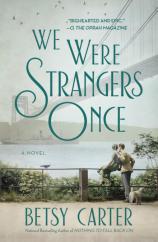We Were Strangers Once
Review
We Were Strangers Once
The talisman, a prosthetic glass eye, was passed down within Egon Schneider's family as a reminder: "Remember, fresh eyes on the world." Egon, the main character in Betsy Carter’s new novel, was the only child of a renowned German naturalist and a talented illustrator. Egon was raised in Frankfurt where he and his mother spent many happy hours in Stadtwald, Frankfurt's largest forest, observing nature and capturing detailed sketches of birds on paper.
Egon moved to Berlin to attend university. There, he and his roommate, a farmer's son and an intellectual named Meyer Leavitt, forged an enduring friendship. After completing their studies, Meyer became an author and editor, and Egon had a highly successful ophthalmology practice.
The Nazis were making life unbelievably difficult for Jews in Germany during the mid-1930s, and both men eventually found their way to New York where they settled in the Washington Heights area.
"WE WERE STRANGERS ONCE, though a work of historical fiction, demonstrates how difficult and stressful it was/is to arrive in a foreign land to begin a new life."
Life was hard for these refugees. Because they were not citizens, spoke English rather haltingly, and their foreign education credentials were not recognized in their new country, the only work they could find was well beneath their abilities. Meyer walked the streets wearing a sandwich board advertising a men's clothing store. Egon worked behind a deli counter, slicing lunch meats and cheese. At Art's Grocery he was known as "The Cheese Man."
Other Jewish friends from Germany settled in Washington Heights where they formed a small community, supporting and encouraging each other. Among the immigrant group, an older couple, the Schnabels, firmly clung to their old country ways, believing that things would improve and they would be able to return to their beloved home someday. No one else in the group harbored such unrealistic sentiments. A young Irish widow, Catrina Harty, who became involved with Egon over their mutual love of animals, became part of their social life. She certainly understood the immigrant experience and discrimination. Many businesses displayed signs that read, "Irish need not apply," and her family suffered many hardships as they struggled to make their way.
Egon's unlicensed veterinary work, in which Catrina often assisted, came to light via articles originally written in Aufbau by Meyer, who was trying to gain attention and support for the plight of the refugees. He wrote, "America is a land of refugees and immigrants. Everyone was once a stranger here." But the article had an undesired effect. It put Egon squarely in the crosshairs of Immigration and Naturalization Services for practicing veterinary medicine without a license.
WE WERE STRANGERS ONCE, though a work of historical fiction, demonstrates how difficult and stressful it was/is to arrive in a foreign land to begin a new life. We are reminded that, yes, we all were strangers here once and that the refugee experience continues to repeat itself today in many parts of the globe. What we see on the evening news is just a tiny glimpse of what strangers to any foreign land must endure and overcome.
Reviewed by Carole Turner on September 15, 2017
We Were Strangers Once
- Publication Date: April 10, 2018
- Genres: Fiction, Historical Fiction
- Paperback: 336 pages
- Publisher: Grand Central Publishing
- ISBN-10: 145557144X
- ISBN-13: 9781455571444




